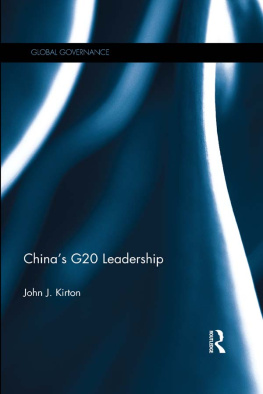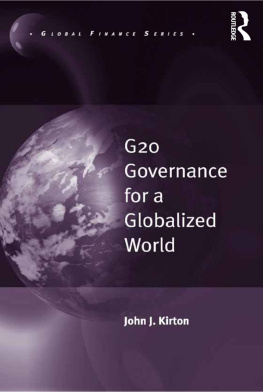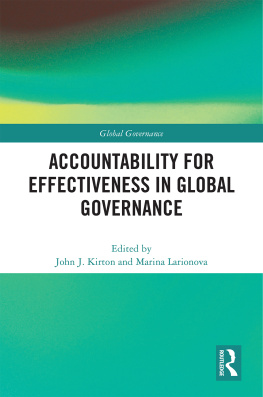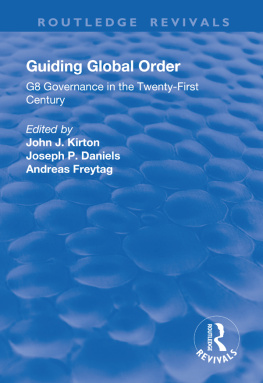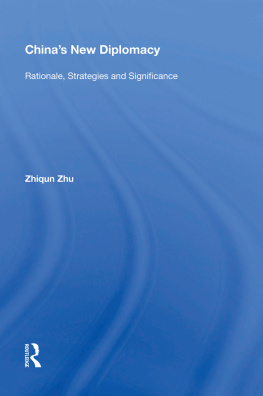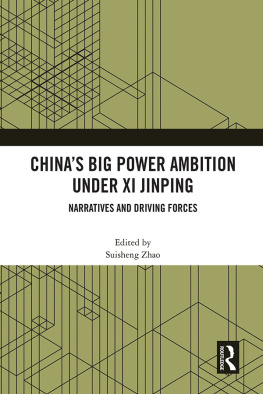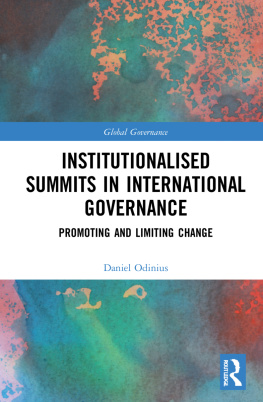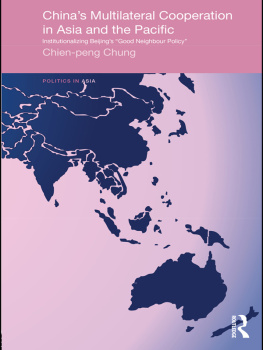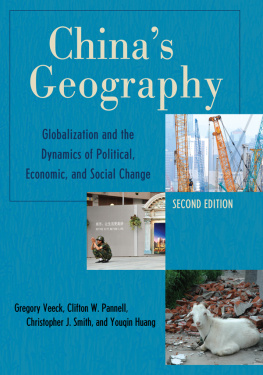Chinas G20 Leadership
Kirton offers a comprehensive, systematic examination of Chinas G20 approach, diplomacy and influence since the G20s start as a forum for finance ministers and central bankers in 1999. This authoritative reference tool works its way through the G20s elevation to the leaders level with summits from 20082015, to the prospects for Chinas first summit as host in Hangzhou in September 2016. This book contains a full treatment of Chinas role in the summits from 2008 to 2015, and Chinas plans, role and prospects for the summits in 2016. Analytically, it develops and tests at the level of a single member country the systemic hub model of G20 governance that was developed for and guided Kirtons 2013 book, G20 Governance for a Globalized World.
John J. Kirton is a professor of political science, co-director and founder of the G20 Research Group, and the director and founder of the G7 Research Group, as well as the co-director of the BRICS Research Group and the Global Health Development Program, at the Munk School of Global Affairs and Trinity College in the University of Toronto, Canada.
Global Governance
Series Editor: John J. Kirton, University of Toronto, Canada
Global governance is growing rapidly to meet the compounding challenges of a globalized 21st-century world. Many issues once dealt with largely at the local, national or regional level are now going global, in the economic, social and political-security domains. In response, new and renewed intergovernmental institutions are arising and adapting, multilevel governance is expanding, and sub-national actors are playing a greater role, complex combinations and private-partnerships to this end.
This series focuses on the new dynamics of global governance in the 21st century by:
Addressing the changes in the structure, operation and impact of individual intergovernmental institutions, above all their innovative responses to the growing global challenges they confront.
Exploring how they affect, are affected by and relate to non-state actors of global relevance and reach.
Examining the processes of cooperation, competition and convergence among international institutions and the many global governance gaps where global challenges such as terrorism, transnational crime and energy do not confront powerful international institutions devoted to their control.
Dealing with how global institutions govern the links among key issues such as climate change and health.
In all cases, it focuses on the central questions of how global governance institutions and processes generate the effective, legitimate, accountable results required to govern todays interconnected, complex, uncertain and crisis-ridden world.
1 Local Politics, Global Impacts
Steps to a Multi-disciplinary Analysis of Scales
Olivier Charnoz, Virginie Diaz Pedregal
2 The G8G20 Relationship in Global Governance
Edited by Marina Larionova and John J. Kirton
3 Chinas G20 Leadership
John J. Kirton
Chinas G20 Leadership
John J. Kirton
First published 2016
by Routledge
2 Park Square, Milton Park, Abingdon, Oxon OX14 4RN
and by Routledge
711 Third Avenue, New York, NY 10017
Routledge is an imprint of the Taylor & Francis Group, an informa business
2016 John J. Kirton
The right of John J. Kirton to be identified as author of this work has been asserted by him in accordance with sections 77 and 78 of the Copyright, Designs and Patents Act 1988.
All rights reserved. No part of this book may be reprinted or reproduced or utilised in any form or by any electronic, mechanical, or other means, now known or hereafter invented, including photocopying and recording, or in any information storage or retrieval system, without permission in writing from the publishers.
Trademark notice: Product or corporate names may be trademarks or registered trademarks, and are used only for identification and explanation without intent to infringe.
British Library Cataloguing-in-Publication Data
A catalogue record for this book is available from the British Library
Library of Congress Cataloging-in-Publication Data
Names: Kirton, John J., author.Title: Chinas G20 leadership / John J.
Kirton.
Description: New York : Routledge, 2016. | Includes bibliographical
references and index.
Identifi ers: LCCN 2016007407 | ISBN 9781472479488 (hardback) |
ISBN 9781315571645 (ebook)Subjects: LCSH: Group of Twenty. |
China--Economic policy--21st century. | China--Economic integration. |
Economic development projects--Management. | China--Foreign economic
relations--21st century.
Classification: LCC HC427.95 K57 2016 | DDC 337.51--dc23
LC record available at http://lccn.loc.gov/2016007407
ISBN: 978-1-4724-7948-8 (hbk)
ISBN: 978-1-315-57164-5 (ebk)
Typeset in Times New Roman
by Saxon Graphics Ltd, Derby
Contents
B.1 Deliberation G20 Leaders Conclusions on China, 200810
B.2 Deliberation Private Conclusions at the 2010 Seoul Summit
C.1 Direction Setting Globalization for All
D.1 Decision Making G20 Summit Commitments by Issue, 20082015
E.1 Delivery G20 Average Compliance Scores, 200814
E.2 Delivery Chinas Compliance by Summit, 200814
E.3 Delivery G20 Average Compliance Scores by Issue, 200814
F.1 Development of Global Governance Outside
F.2 Development of Global Governance Civil Society Bodies
G.1 Shock-Activated Vulnerability Recognized
H.1 International Institutional Performance Predictive Accuracy of the International Monetary Fund
H.2 International Institutional Performance Multilateral Organizations Head/Chair/Location by Country
I.1 Capability G20 Members by Gross Domestic Product
I.2 Capability Share of Global Payments
I.3 Capability BBC World Opinion Poll, 201014
J.1 Converging Political Characteristics Polity IV Authority Trends, 19992014
L.1 Club at Hub G20 Summit Participation
L.2 Club at Hub Global Governance Summit Network
This book has been almost two decades in the making. It started with my interest in China as part of my work on Group of Seven/Eight (G7/8) governance during the Asian-turned-global financial crisis of 19972002. It increased with the outreach that brought China to the G8 summits in 2003 and from 2005 to 2009, and the Major Economies Meeting and Forum on energy security and climate change that brought the leaders of the G8, China and selected other emerging powers together in 2008 and 2009. China then emerged as a central actor in my book on G20 Governance for a Globalized World, published in 2013. It did even more so in my book with Ella Kokotsis, The Global Governance of Climate Change: G7, G20 and UN Leadership, published in 2015.
In writing those two books, I became aware not only of Chinas central and growing contribution to the governance of the Group of 20 (G20) but also of the absence of any book-length account on Chinas G20 governance and why China has evolved along its particular G20 path. I also noted the great gulf in the scholarly and other serious writings on this subject in article, chapter, research report or even blog form, between western scholars on the one hand and their counterparts in China, writing in Chinese. This book is, in the first instance, an effort to provide the first systematic, detailed, if brief, empirical account of what China has done in the G20 and why. It also seeks to bridge the gap between western and Chinese understanding of the subject by mobilizing both in the research for this book.

